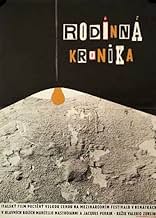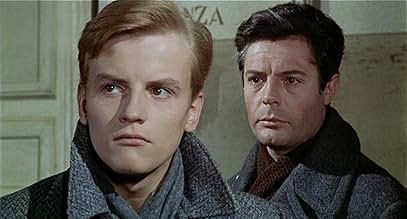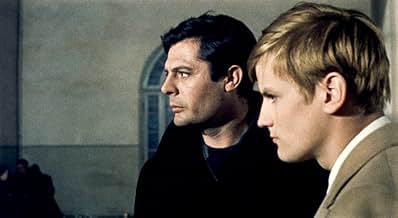NOTE IMDb
7,2/10
1,3 k
MA NOTE
Rome, 1945. Enrico Corsi, journaliste se souvient de la vie de son jeune frère décédé.Rome, 1945. Enrico Corsi, journaliste se souvient de la vie de son jeune frère décédé.Rome, 1945. Enrico Corsi, journaliste se souvient de la vie de son jeune frère décédé.
- Réalisation
- Scénario
- Casting principal
- Récompenses
- 5 victoires et 3 nominations au total
Angelo Casadei
- Un visitatore all'ospedale
- (non crédité)
Avis à la une
10Aw-komon
Phew! What a beautiful film! I'd rank this as one of the most awe-inspiringly composed and photographed color films of all time. You've never seen Mastroianni, until you've seen him in this film, walking around like an iconic black ghost in the darkly hued existentialist-to-the-nth-degree technicolor universe of post-war Italy created by Zurlini and legendary DP Giussepe Rottuno. What a stroke of genius to contrast the bleakest and most depressing of subjects possible with the most fantastically poetic and gorgeous technicolor cinematography this side of `Black Narcissus.' This is one of Rottuno's finest works ever: full of absolutely breathtaking deeper than deep blacks and colors that seem to have sprouted from some otherworldly weathered, neo-realist hallucination. And what timeless subtly paced, unerringly poetic, intelligent and completely uncompromising direction by Zurlini, the forgotten genius of Italian cinema, whose style in this film can be roughly described as a unique melange of neo-realism, Antonioni, Michael Powell, Jacques Becker, early Pasolini and early Bertolucci. It's easy to imagine how easily this story of a tubercular writer grieving the death of his younger brother through a series of flashbacks could've turned into not much more than a melodramatic tearjerker; yet in Zurlini's hands and through the incredible, tour-de-force performance of Marcello Mastroiani in the lead role, the Marxist-proleteriat-plight-of-the-poor sentimentality at the film's core transcends itself and becomes a deeply affecting, painful and ultimately cathartic meditation on death, despair, and the possibilities of redemption in the direst of circumstances.
10fjoffily
This is one of the most moving films ever made. The atmosphere, the settings, the use of colour and the superb mastery of Zurlini's hand make Mastroianni and Perrin reach unthought-of characterisations of the two unhappy brothers. This is not a movie for all audiences. Its own qualities make it selective in itself. All the misery, sorrow, suffering and delicacy of the feelings that pervade the life of the two characters are brought to life with a sort of detachment and (paradoxically as it may seem) intimacy seldom seen in the screen. Absolutely a must. When will this masterpiece be available on DVD ?
How this one slipped off the radar screen is beyond understanding. Against a very muted palette of tone on tone, in which the character Lorenzo's beige over-coat becomes a metaphor of his indefinite link with the beige walled world, director Zurlini weaves a fascinating story of two brothers separated at birth, who effect a tragic reunion in war torn Italy.
Marcello Mastiroianni here offers a performance of greater depth than "La Dolce Vita" (which is just as it should be)but it is youngster Jacques Perrin's "Lorenzo" which surprises.
His performance, (indeed the whole film) is a study in the power of the reticence, understatement and the unsaid. Mr. Perrin's eyes, particularly in the hospital sequences, speak those volumes and light those vistas that would be trivialized in dialog form.
An excellent film with a core of deep sadness, that avoids the fatal commercial trap of sentimentalism.
Marcello Mastiroianni here offers a performance of greater depth than "La Dolce Vita" (which is just as it should be)but it is youngster Jacques Perrin's "Lorenzo" which surprises.
His performance, (indeed the whole film) is a study in the power of the reticence, understatement and the unsaid. Mr. Perrin's eyes, particularly in the hospital sequences, speak those volumes and light those vistas that would be trivialized in dialog form.
An excellent film with a core of deep sadness, that avoids the fatal commercial trap of sentimentalism.
10Oskado
This is a film so great that to attempt to describe it nearly forces one into poetry. The visual flow alone is like a walk through all the great art galleries of the Western world, and the camera pauses on many of those scenes to permit us to admire and study the surprising compositions and tonal pallets. The story is viewed oddly in the third person - I felt somewhat like an astronomer viewing the short-lived movement of a group of comets through the coldness of space and time - helplessly seeking meaning and comfort through love, but doomed to end meaningless and forgotten - following some brutish laws of physics whose study seems a shrewd exercise in futility.
The scope of action is exceedingly restricted - perhaps more microscopic than telescopic - in the end, it's all the same: universal and intimate, cold and loving, helpless, with an odd image of Joseph's multi-colored coat haunting the mind - yet another symbolic object long rotted into the dust as must all symbols.
This is the work of people who have a very mature, objective understanding of life and who, without romanticizing or distorting or euphemizing, have created something both true and extraordinarily beautiful.
The scope of action is exceedingly restricted - perhaps more microscopic than telescopic - in the end, it's all the same: universal and intimate, cold and loving, helpless, with an odd image of Joseph's multi-colored coat haunting the mind - yet another symbolic object long rotted into the dust as must all symbols.
This is the work of people who have a very mature, objective understanding of life and who, without romanticizing or distorting or euphemizing, have created something both true and extraordinarily beautiful.
I wept like I hadn't wept in a movie for years. Director Valerio Zurlini and his cinematographer Giuseppe Rotunno gives us a visual symphony in browns and dark yellows. The faces of the brothers Enrico and Lorenzo played with shattering truth by Marcello Mastroianni and Jaques Perrin have made a home in my brain. Their reunion with their grandmother, played by the sublime Sylvie, is an image, a film moment that I shall never forget. As it happens more often than not, the Italians have released this gem in DVD without English subtitles - not in English or any other language for that matter. I'm grateful for speaking and understanding Italian well enough to enjoy this movie to the fullest. If you do as well, I recommend it wholeheartedly.
Le saviez-vous
- AnecdotesJacques Perrin had already played a boy named Lorenzo in the previous movie by Valerio Zurlini, "Girl with a Suitcase"
- GaffesIn the later sequence in the hospital, there are hairs on the film in several scenes.
- ConnexionsReferenced in Close-Up: Why do We Need the Venice Film Festival? (2024)
Meilleurs choix
Connectez-vous pour évaluer et suivre la liste de favoris afin de recevoir des recommandations personnalisées
Détails
- Durée1 heure 53 minutes
- Mixage
- Rapport de forme
- 1.85 : 1
Contribuer à cette page
Suggérer une modification ou ajouter du contenu manquant

Lacune principale
By what name was Journal intime (1962) officially released in Canada in English?
Répondre























